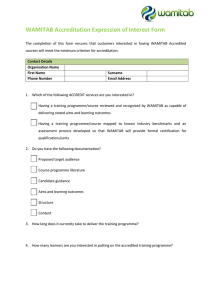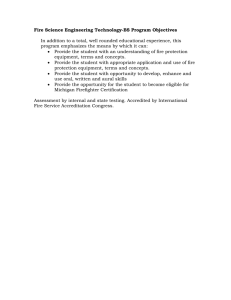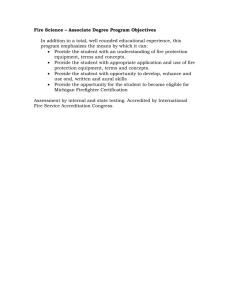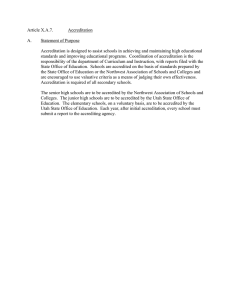ATP ACCREDITATION QUESTIONNAIRE EXPLANATORY NOTES
advertisement
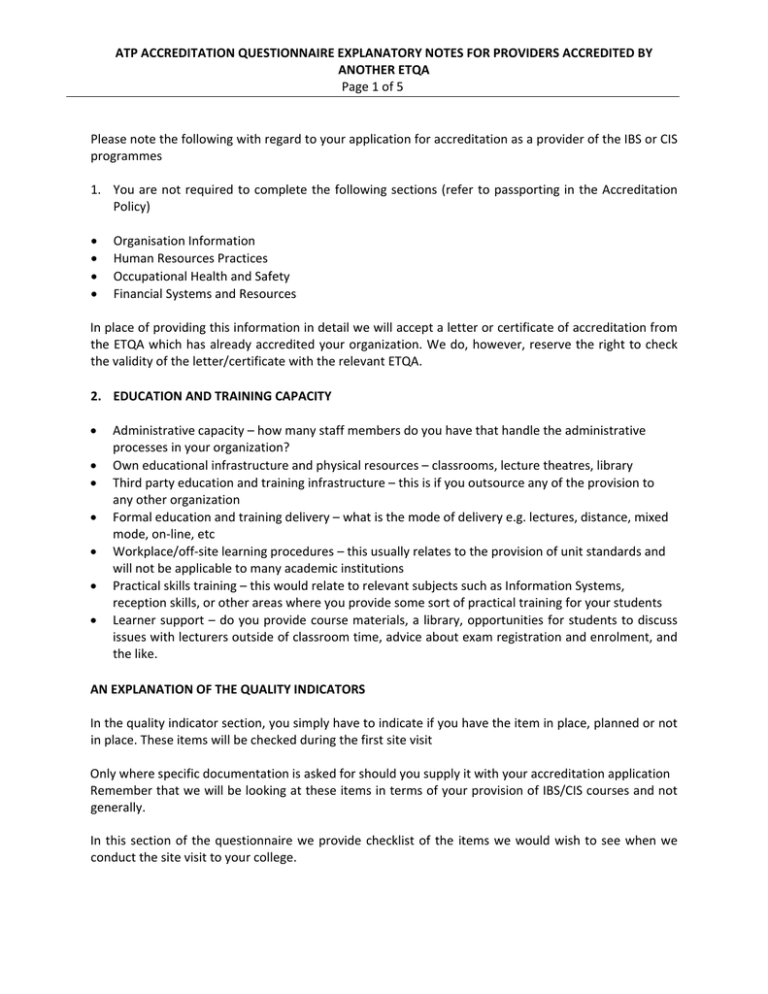
ATP ACCREDITATION QUESTIONNAIRE EXPLANATORY NOTES FOR PROVIDERS ACCREDITED BY ANOTHER ETQA Page 1 of 5 Please note the following with regard to your application for accreditation as a provider of the IBS or CIS programmes 1. You are not required to complete the following sections (refer to passporting in the Accreditation Policy) • Organisation Information • Human Resources Practices • Occupational Health and Safety • Financial Systems and Resources In place of providing this information in detail we will accept a letter or certificate of accreditation from the ETQA which has already accredited your organization. We do, however, reserve the right to check the validity of the letter/certificate with the relevant ETQA. 2. EDUCATION AND TRAINING CAPACITY • Administrative capacity – how many staff members do you have that handle the administrative processes in your organization? • Own educational infrastructure and physical resources – classrooms, lecture theatres, library • Third party education and training infrastructure – this is if you outsource any of the provision to any other organization • Formal education and training delivery – what is the mode of delivery e.g. lectures, distance, mixed mode, on‐line, etc • Workplace/off‐site learning procedures – this usually relates to the provision of unit standards and will not be applicable to many academic institutions • Practical skills training – this would relate to relevant subjects such as Information Systems, reception skills, or other areas where you provide some sort of practical training for your students • Learner support – do you provide course materials, a library, opportunities for students to discuss issues with lecturers outside of classroom time, advice about exam registration and enrolment, and the like. AN EXPLANATION OF THE QUALITY INDICATORS In the quality indicator section, you simply have to indicate if you have the item in place, planned or not in place. These items will be checked during the first site visit Only where specific documentation is asked for should you supply it with your accreditation application Remember that we will be looking at these items in terms of your provision of IBS/CIS courses and not generally. In this section of the questionnaire we provide checklist of the items we would wish to see when we conduct the site visit to your college. ATP ACCREDITATION QUESTIONNAIRE EXPLANATORY NOTES FOR PROVIDERS ACCREDITED BY ANOTHER ETQA Page 2 of 5 You are NOT required to submit all the documentation with your application form. The checklist will help you to prepare adequately for the site visit. At the end of the checklist, you will find a list of the documentation that is required to be submitted. ORGANIZATIONAL CAPACITY • Ratios – learner per facilitator / assessor – how many students do you have per educator? E.g. 50:1 • Class sizes are consistent with claims made in promotional material – if you say your classes are small with individualised learning, then we would expect to see evidence of this when we do the site visit. • Classrooms used for ICSA classes are comfortable and of an appropriate size with adequate desk space for individuals – this will be checked on the site visit – we would, for example, not want to see students sitting on the floor or classrooms in a state of disrepair and not conducive to learning • Assessor per moderator – this relates to internal assessment such as continuous, formative assessment. Do you conduct continuous assessment? If so are the questionnaires, tests, etc moderated? Is the marking moderated? • Geographical spread – do you operate in various locations? • Quality provision – this relates to the standard of your course materials, promotional materials, etc. QMS • Organisational commitment and management – your mission statement • Administrative management – what processes and procedures are in place to ensure that the information you capture is correct and accurate; • Learning management and administration – provide samples from your database • Assessment Management (provide Assessment and Moderation Policy) – this would relate to your internal assessment policies, if any. • ETD Staff Management – how do you appoint your teaching staff? Are they contracted or permanent? If contracted, we would like to see copies of these contracts. • Learnership Management – if any learnerships are in place • Recognition of prior learning policy – are you aware of the IBS/CIS RPL policy? Do you make the necessary arrangements with the Institute for RPL before accepting a student into the course? Do you have your own RPL policy? FACILITIES • Institution offers tuition for an ICSA qualification or modules – you would have indicated this in your application form • Institution has permanent premises for administration and tuition or makes appropriate provision (in the case of distance learning providers only) – most tuition providers would be able to answer “in place” to this item but there may be some who operate on a consultancy basis where they other premises, in which case you may not have permanent premises. • Tuition provider has an email address and access to ICSA’s website • Institution has a regularly updated website – you would need to give us details so we can check this • Modern presentation equipment is used e.g. overhead projectors, data projectors, DVD’s, flipcharts ATP ACCREDITATION QUESTIONNAIRE EXPLANATORY NOTES FOR PROVIDERS ACCREDITED BY ANOTHER ETQA Page 3 of 5 LEARNER COMMUNICATION • Communication strategies are in place – what information do you provide to prospective students regarding the courses and how and where do you promote the courses – samples of advertisements, your own prospectus, brochures, etc would be useful • Communication materials provide correct information regarding qualifications, etc. – we will check your promotional materials for this • Communication strategies include: the information you provide for each of the following will be checked during the site visit so they should be readily available. o General learner information – IBS/CIS prospectuses o Career paths and options for progression – are these detailed in your publicity material and do you make students aware of the opportunities that the qualifications of the Institute offer? o Membership information – are you aware and do you make your students aware of the various categories of membership of the Institute and the benefits of such membership? o Assessments/examinations – are students aware of the need to register separately for the examinations at an additional fee? Are students aware that the examinations are external examinations not conducted by your organization? o Additional support available to learners – you will have provided details above, but is this information included in your communication to learners? o Code of conduct and disciplinary actions – Do you have your own code of conduct and disciplinary policy? Are students aware of the Institute’s student code of conduct and disciplinary actions that can be taken for non‐compliance? How is this communicated to your students? o Grievances/ Appeals – Do you have your own grievances and appeals procedure in place? Are students aware of the Institute’s grievances and appeals procedures? How is this communicated to your students? o Other STUDENT SUPPORT • There are designated staff to deal with ICSA enquiries – your staff should be knowledgeable about the courses examined by the Institute so that they can advise students correctly. • There is a designated ICSA course leader in post – this may be the principal in a small organization or a head of department in a large organization. It refers to someone who takes overall responsibility for the support of students taking an IBS/CIS course • Tutors delivering ICSA course are appropriately qualified – your teaching staff cv’s will be checked • Staff meet at least annually to review ICSA course provision and results (attach evidence) e.g. minutes of a meeting at which you discuss issues surrounding your provision of IBS/CIS courses • A course handbook is provided to all ICSA students containing course structure, timetable, important institutional and Institute deadlines, information on facilities, information on support materials provided, contact details and availability of tutors and complaints procedure – this would be your Institution’s • Student feedback questionnaires are used to measure and record student feedback – we would want to see a sample of completed questionnaires ATP ACCREDITATION QUESTIONNAIRE EXPLANATORY NOTES FOR PROVIDERS ACCREDITED BY ANOTHER ETQA Page 4 of 5 • Tutors and students have access to up‐to‐date ICSA study texts – do you use the study texts provided by the Institute or do you provide your own? If the latter, then we would want to see a range of these texts. • Tutors and students have access to ICSA past examination papers and suggested answers (www.icsa.co.za) – are you aware that these are available? Do students have access to them either from you in printed form or are they advised to access them from the website? What use do you make of past papers in the delivery of the programme? • Tutors and students have access to a minimum of 50% of recommended reading for each ICSA module where specified – do you have a library of books available to your students? • Students and staff have access to the Chartered Secretary magazine, Boardroom – this will be supplied to all Accredited Tuition Providers free of charge. • Formal student representation is encouraged and integrated into the institution’s quality assurance procedures – do you have an SRC? We would want to speak to representatives of the SRC during our site visit. • Issues identified by students either in questionnaires or complaints are followed up and action taken to resolve difficulties in a positive manner – how do you monitor complaints or issues e.g. during staff meetings or course review meetings? Minutes of meetings should be available as evidence • The institution has a formal complaints procedure in place which is transparent, consistent and fair and which results in acceptable outcomes – you would need to provide us with a copy of this procedure • All promotional material complies with ICSA’s guidelines on promotional materials – is your publicity material in line with our prospectuses and information? We would need to see copies of your promotional material. • Counselling should be offered at least once per course for marginal and failing students – an explanation of how this is done will be required and preferably documented briefly in the information provided to students • Student absences are followed up – we would like to see class registers, letters to students/parents or records of actions taken in a student’s file, for example • Disabled access to all facilities and support materials is available – you would need to explain what access you provide within the limitations of your resources FINANCES • The institution is financially viable – this would be evident from your financial statements • Tuition provider’s most recent financial statements HUMAN RESOURCES • Summary CVs for course tutors ‐ these need to be submitted with your application • Contingency plans are in place to cover staff absences – how do you cater for such instances? ASSESSMENT • Assessment & RPL ‐ Policy, practices and process – we will want to see your assessment policy for your internal assessment processes if any, assessment plans for the various courses and subjects ATP ACCREDITATION QUESTIONNAIRE EXPLANATORY NOTES FOR PROVIDERS ACCREDITED BY ANOTHER ETQA Page 5 of 5 • • • • and how you monitor student achievements e.g. records. Do you have an understanding of the Institute’s external Assessment Policy? Management, review, role players – Who is involved in assessing your students? What records do you keep? Do students have a voice? Principles, instruments, access – is assessment aimed at achieving outcomes? Provide examples of internal tests, memoranda, etc. Role players’ competence and capacity – this would relate to the competence of your teaching staff to carry out such assessment e.g. how are they qualified? Have they done the assessor training course based on the Unit Standard 115753 (SAQA)? If not what qualifies them to assess? Practice and/or mock examinations are available during the course with feedback provided – this relates to the earlier question on access to past examination papers? How do you make use of these in your organization? MODERATION • Policy, practice and process – do you have an internal moderation policy? How do you moderate your internal assessment results, bearing in mind that moderation can take place before assessment, during assessment and post assessment? Are you aware of the Institute’s moderation policy? • Role players’ competence and capacity, management – this would relate to the competence of your teaching staff to carry out such moderation e.g. how are they qualified? Have they done the assessor training course based on the Unit Standard 115759 (SAQA)? If not what qualifies them to moderate? • Scope, impact, instruments – what do you moderate? What impact does moderation have on your assessment? What instruments do you use e.g. checklists, reports on assessment and suggested improvements.
